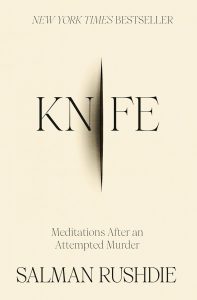All memoirs should be measured against this harrowing account by Salman Rushdie of the 2022 attack that nearly killed him and left him half-blind: detailed, unblinking, contextual, and surprisingly soulful – all packed with precision into two-hundred pages.

To hijack a phrase I’m sure I picked up from someone else’s review: “Knife” is a display of Rushdie in full command of his talents: inventiveness, intellectual breadth, insight into the foibles of humanity, and an emotional spectrum that runs from anger to fear to love to outrage.
Rushdie lived beneath the sword since 1989 when Ayatollah Khomeini of Iran issued a fatwa calling for his execution, proclaiming that Rushdie’s book, “The Satanic Verses,” defamed Muhammad. With time, the threat seemed to diminish. Still, says Rushdie, he was not surprised one day, while standing on stage, to see a young man appear from the audience and lunge toward him with a knife.
“I confess,” he says, “I had sometimes imagined my assassin rising up in some public forum or other and coming for me in just this way. So my first thought when I saw this murderous shape rushing toward me was: So it’s you. Here you are. It is said that Henry James’s last words were ‘So it has come at last, the distinguished thing.’ Death was coming at me, too.”
The book begins here and follows Rushdie’s journey of recovery and rediscovery – of who he is, of what he loves and why, and of the importance of art and honesty in a pluralistic society.
“I had to write the book you’re reading now.” he says, “before I could move on to anything else. To write would be my way of owning what had happened, taking charge of it, making it mine, refusing to be a mere victim. I would answer violence with art.”
Indeed, “Knife” is art – it is personal, yet universal; it is wisdom distilled from pain; it answers the question everyone must face when calamity confronts them: “One has to find life … One can’t just sit about recovering from near death. One has to find life.”
